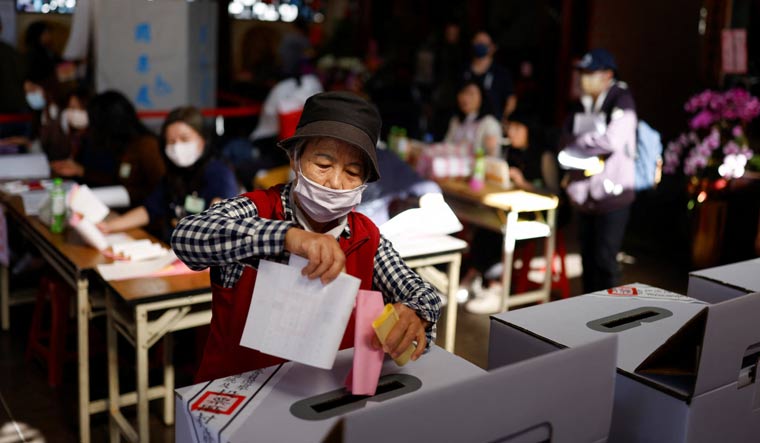Taiwanese are casting their votes on Saturday for a new president and legislature in an election that could chart the trajectory of the self-ruled democracy's relations with China over the next four years.
At stake is the peace and stability of the island 160 kilometers (100 miles) off the coast of China that Beijing claims as its own, to be retaken by force if necessary. Domestic issues such as the sluggish economy and expensive housing also featured prominently in the campaign.
ALSO READ: Nothing but China really matters in Taiwan elections
Vice President Lai Ching-te, representing the governing Democratic Progressive Party, known as the DPP, seeks to succeed outgoing President Tsai Ing-wen and give the independence-leaning party an unprecedented third term.
Lai cast his vote in his hometown of Tainan. He remarked on the sunny weather, suggesting it's a good time for Taiwanese people to go out and vote.
“I encourage everyone around the country to vote with enthusiasm and show the vitality of Taiwan's democracy,” he said.
ALSO READ: Democratic consolidation in Taiwan showcases resilience of democracy
Hou Yu-ih, the candidate of Beijing-favoured Kuomintang, also known as the Nationalist Party, cast his ballot in New Taipei City, a municipality bordering the capital, Taipei. Hou is the mayor of New Taipei, a position from which he took leave to run for president.
Alternative candidate Ko Wen-je of the Taiwan People's Party, who has shown popularity among young voters seeking an alternative to the two major parties, voted in Taipei.
Voting began at 8am (0000 GMT) on Saturday and is to wrap up eight hours later.
Candidates concluded their campaigns on Friday night with stirring speeches, but younger voters were mostly focused on their economic futures in a challenging environment.
Speaking in his hometown of Tainan in the island's south, Lai reflected on why he left his career as a surgeon because of China's missile tests and military exercises aimed at intimidating Taiwanese voters before the first open presidential election in 1996.
“I wanted to protect the democracy that had just gotten underway in Taiwan. I gave up my well-paid job and decided to follow the footsteps of our elders in democracy,” Lai said.
Hou, a former head of Taiwan's police force, said Lai's view on relations with Beijing could push the two sides to war.
“I advocate pragmatic exchanges with China, the defence of national security, and protection of human rights. I insist that Taiwan's future will be decided by the 23.5 million (people of Taiwan), and I will use my life to protect Taiwan,” Hou said.
China's military threats could sway some voters against independence-leaning candidates, but the US has pledged support for whichever government emerges, reinforced by the Biden administration's plans to send an unofficial delegation made up of former senior officials to the island shortly after the election.
Besides the China tensions, domestic issues dominated the campaign, particularly an economy that was estimated to have grown just 1.4 per cent last year. That partly reflects inevitable cycles in demand for computer chips and other exports from the high-tech, heavily trade-dependent manufacturing base, and a slowing of the Chinese economy.
But longer-term challenges such as unaffordable housing and wage stagnation topped voters' concerns.
The candidate with the most votes wins, with no runoff. The legislative races are for districts and at-large seats.



